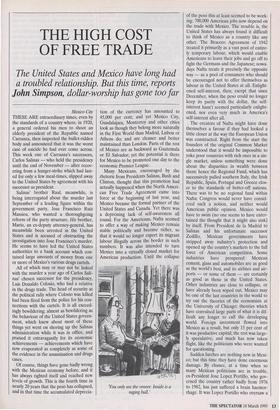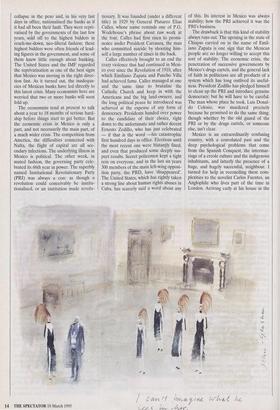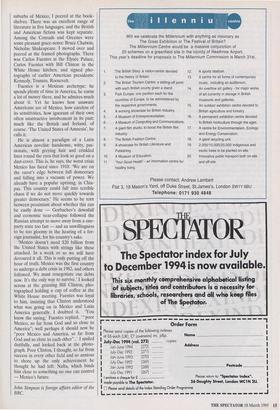THE HIGH COST OF FREE TRADE
The United States and Mexico have long had a troubled relationship. But this time, reports
John Simpson, dollar-worship has gone too far Mexico City THESE ARE extraordinary times, even by the standards of a country where, in 1920, a general ordered his men to shoot an elderly president of the Republic named Carranza, then inspected the bullet-ridden body and announced that it was the worst case of suicide he had ever come across. This week one of Carranza's successors, Carlos Salinas — who held the presidency until the end of November — after recov- ering from a hunger-strike which had last- ed for only a few meal-times, slipped away to the United States by agreement with his successor as president.
Salinas' brother Raul, meanwhile, is being interrogated about the murder last September of a leading figure within the government party, Jose Francisco Ruiz Massieu, who wanted a thoroughgoing reform of the party structure. His brother, Mario, an ex-deputy attorney-general, has meanwhile been arrested in the United States and is accused of obstructing the investigation into Jose Francisco's murder. He seems to have led the United States authorities to a bank account which con- tained large amounts of money from one or more of Mexico's various drugs cartels.
All of which may or may not be linked with the murder a year ago of Carlos Sali- nas' chosen successor for the presidency, Luis Donaldo Colosio, who had a relative in the drugs trade. The head of security at the political rally where Colosio was killed had been fired from the police for his con- nections with the cartels. It is all exceed- ingly bewildering; almost as bewildering as the behaviour of the United States govern- ment, which knew about most of these things yet went on shoring up the Salinas administration while it was in office, and praised it extravagantly for its economic achievements — achievements which have now evaporated as completely as some of the evidence in the assassination and drugs cases.
Of course, things have gone badly wrong with the Mexican economy before, and it has always righted itself and reached new levels of growth. This is the fourth time in nearly 20 years that the peso has collapsed, and in that time the accumulated deprecia- tion of the currency has amounted to 45,000 per cent; and yet Mexico City, Guadalajara, Monterrey and other cities look as though they belong more naturally in the First World than Madrid, Lisbon or Athens do; and are cleaner and better maintained than London. Parts of the rest of Mexico are as backward as Guatemala or El Salvador; yet the potential is there for Mexico to be promoted one day to the economic Premier League.
Many Mexicans, encouraged by the rhetoric from Presidents Salinas, Bush and Clinton, thought that this promotion had actually happened when the North Ameri- can Free Trade Agreement came into force at the beginning of last year, and Mexico became the formal partner of the United States and Canada. Yet there was a depressing lack of self-awareness all round. For the Americans, Nafta seemed to offer a way of making Mexico remain stable politically and become richer, so that it would no longer export its migrant labour illegally across the border in such numbers. It was also intended to turn Mexico into a virtually closed market for American production. Until the collapse `You only see the veneer. Inside is a raging bull.' of the peso this at least seemed to be work- ing: 700,000 American jobs now depend on the trade with Mexico. The trouble is, the United States has always found it difficult to think of Mexico as a country like any other. The Bracero Agreement of 1942 treated it primarily as a vast pool of entire- ly temporary labour, which would enable Americans to leave their jobs and go off to fight the Germans and the Japanese; nowa- days Nafta treats it precisely the opposite way — as a pool of consumers who should be encouraged not to offer themselves as labour in the United States at all. Enlight- ened self-interest, then; except that since December, when the peso could no longer keep its parity with the dollar, the self- interest hasn't seemed particularly enlight- ened, nor even very much in America's self-interest after all.
The creators of Nafta might have done themselves a favour if they had looked a little closer at the way the European Union was constructed. Right from the start the founders of the original Common Market understood that it would be impossible to yoke poor countries with rich ones in a sin- gle market, unless something were done about the disparities in wealth between them; hence the Regional Fund, which has successively pulled southern Italy, the Irish Republic, Spain, Portugal and Greece clos- er to the standards of better-off nations. There was to be no regional fund within Nafta: Congress would never have consid- ered such a notion, and neither would American public opinion. Mexico would have to swim (no one seems to have enter- tained the thought that it might also sink) by itself. From President de la Madrid to Salinas and his unfortunate successor Zedillo, Mexican governments have stripped away industry's protection and opened up the country's markets to the full force of American competition. Some industries have prospered: Mexican cement, glass and automobiles are as good as the world's best, and its airlines and air- ports — or some of them — are certainly as good as those in the United States. Other industries are close to collapse, or have already been wiped out. Mexico may be one of the last countries in the world to try out the theories of the economists at the University of Chicago: theories which have convulsed large parts of what it is dif- ficult any longer to call the developing world. Foreign investment flowed into Mexico as a result, but only 15 per cent of it was productive capital; the rest was large- ly speculative, and much has now taken flight, like the politicians who were wanted for questioning.
Sudden lurches are nothing new in Mexi- co; but this time they have done enormous damage. By chance, at a time when so many Mexican politicians are in trouble, ex-President Jose Lopez Portillo, who gov- erned the country rather badly from 1976 to 1982, has just suffered a brain haemor- rhage. It was Lopez Portillo who oversaw a collapse in the peso and, in his very last days in office, nationalised the banks as if it had all been their fault. They were repri- vatised by the governments of the last few years, sold off to the highest bidders in reach-me-down, neo-liberal fashion; these highest bidders were often friends of lead- ing figures in the government, and some of them knew little enough about banking. The United States and the IMF regarded the reprivatisation as one of the best signs that Mexico was moving in the right direc- tion fast. As it turned out, the inadequa- cies of Mexican banks have led directly to this latest crisis. Many economists here are worried that two or more banks will soon fold up.
The economists tend at present to talk about a year to 18 months of serious hard- ship before things start to get better. But the economic crisis in Mexico is only a part, and not necessarily the main part, of a much wider crisis. The competition from America, the difficulties connected with Nafta, the flight of capital are all sec- ondary infections. The underlying illness in Mexico is political. The other week, in muted fashion, the governing party cele- brated its 66th year in power. The superbly named Institutional Revolutionary Party (PRI) was always a con: as though a revolution could conceivably be institu- tionalised, or an institution made revolu- tionary. It was founded (under a different title) in 1929 by General Plutarco Elias Calles, whose name reminds one of P.G. Wodehouse's phrase about raw work at the font. Calles had first risen to promi- nence under President Carranza, the man who committed suicide by shooting him- self a large number of times in the back.
Calles effectively brought to an end the crazy violence that had continued in Mexi- co ever since the Revolution of 1910, after which Emiliano Zapata and Pancho Villa had achieved fame. Calles managed at one and the same time to brutalise the Catholic Church and keep in with the Americans and the big land-owners; and the long political peace he introduced was achieved at the expense of any form of democracy. Presidents handed over power to the candidate of their choice, right down to the unfortunate and rather decent Ernesto Zedillo, who has just celebrated — if that is the word —his catastrophic first hundred days in office. Elections until the most recent one were blatantly fixed, and even that produced some deeply sus- pect results. Secret policemen kept a tight rein on everyone, and in the last six years 300 members of the main left-wing opposi- tion party, the PRD, have 'disappeared'. The United States, which has rightly taken a strong line about human rights abuses in Cuba, has scarcely said a word about any of this. Its interest in Mexico was always stability; how the PRI achieved it was the PRI's business.
The drawback is that this kind of stability always runs out. The uprising in the state of Chiapas carried on in the name of Emil- iano Zapata is one sign that the Mexican people are no longer willing to accept this sort of stability. The economic crisis, the penetration of successive governments by Mexico's drugs cartels, and the general lack of faith in politicians are all products of a system which has long outlived its useful- ness. President Zedillo has pledged himself to clean up the PRI and introduce genuine democracy; but he will have to be careful. The man whose place he took, Luis Donal- do Colosio, was murdered precisely because he promised to do the same thing; though whether by the old guard of the PRI or by the drugs cartels, or someone else, isn't clear.
Mexico is an extraordinarily confusing country, with a convoluted past and the deep psychological problems that come from the Spanish Conquest, the intermar- riage of a creole culture and the indigenous inhabitants, and latterly the presence of a huge, and hugely successful, neighbour. I turned for help in reconciling these com- plexities to the novelist Carlos Fuentes, an Anglophile who lives part of the time in London. Arriving early at his house in the suburbs of Mexico, I peered at the book- shelves. There was an excellent range of literature in five languages, and the British and American fiction was kept separate. Among the Conrads and Greenes were some pleasant grace-notes: Bruce Chatwin, Nicholas Shakespeare. I moved over and peered at the framed photographs. There was Carlos Fuentes at the Elysee Palace, Carlos Fuentes with Bill Clinton in the White House kitchen, and signed pho- tographs of earlier American presidents: Kennedy, Truman, Roosevelt.
Fuentes is a Mexican archetype: he spends plenty of time in America, he earns a lot of money there, and he admires much about it. Yet he knows how unaware Americans are of Mexico, how careless of its sensitivities, how ignorant of their own often unattractive involvement in its past; much like the British and Ireland, of course. 'The United States of Amnesia', he calls it.
He is almost a paradigm of a Latin American novelist: handsome, witty, pas- sionate, with greying hair and crinkled lines round the eyes that look so good on a dust-cover. This is, he says, the worst crisis Mexico has faced since 1910. 'We are on the razor's edge between full democracy and falling into a vacuum of power. We already have a popular uprising, in Chia- pas. This country could fall into terrible chaos if we do not move quickly towards greater democracy.' He seems to be torn between pessimism about whether this can be easily done — Gorbachev's downfall and economic near-collapse followed the Russian attempt to move away from a one- party state too fast — and an unwillingness to be too gloomy in the hearing of a for- eign journalist, for his country's sake.
`Mexico doesn't need $20 billion from the United States with strings like these attached. In a week or so we will have devoured it all. This is only putting off the hour of truth. Mexico was the first country to undergo a debt crisis in 1982, and others followed. We must renegotiate our debts now. It's the only way to survive.' I looked across at the grinning Bill Clinton, pho- tographed holding a cup of coffee at the White House meeting. Fuentes was loyal to him, insisting that Clinton understood what was going on in Mexico and Latin America generally. I doubted it. 'You know the saying,' Fuentes replied, `" poor Mexico, so far from God and so close to America"; well perhaps it should now be "poor Mexico and America, so far from God and so close to each other" . ' I smiled dutifully, and looked back at the photo- graph. Poor Clinton, I thought, so far from success in every other field and so anxious to shore up the only achievement he thought he had left: Nafta, which binds him close to something no one can control — Mexico's future.
John Simpson is foreign affairs editor of the BBC.




























































 Previous page
Previous page